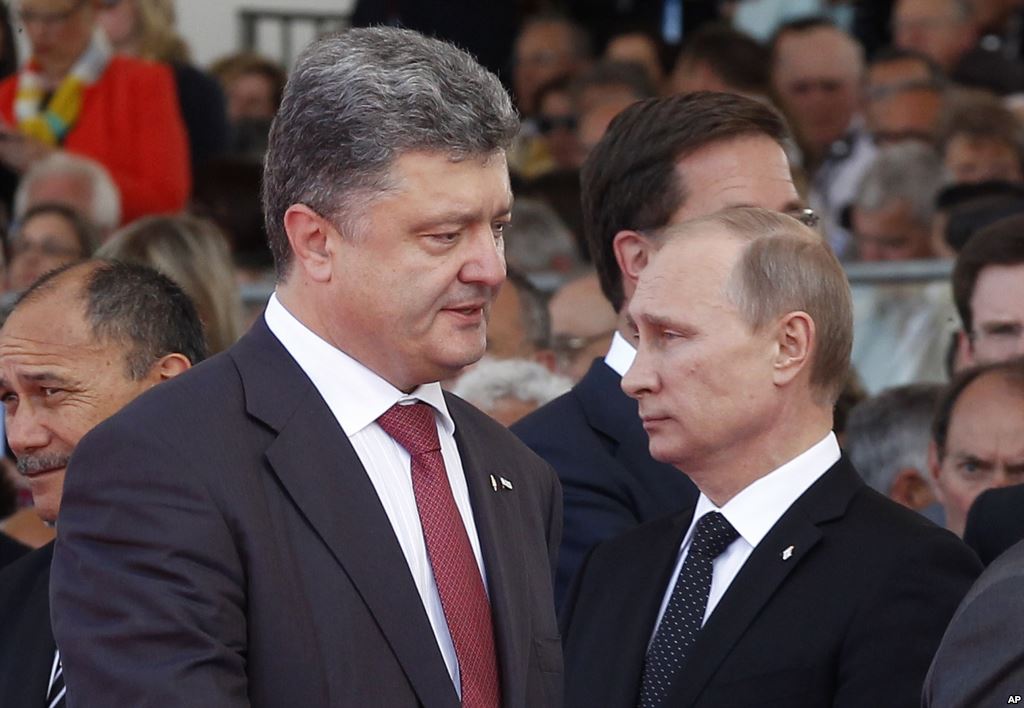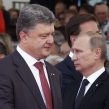
Moscow Juggling the Concept of Ukraine’s Territorial Integrity (Part One)
Publication: Eurasia Daily Monitor Volume: 11 Issue: 222
By:

A tactical shift is noticeable in Russia’s policy toward Ukraine. The Kremlin has adjusted its rhetoric, and Russian diplomacy its terminology. They seem to suggest that Russia is restraining its territorial and political objectives in Ukraine. In parallel, Russia is suspending offensive military actions by its own and proxy forces in Ukraine’s Donbas (region encompassing the Luhansk and Donetsk provinces) (see accompanying article).
During the month of November, Kremlin-controlled television channels wound down their previously intense propagation of the “Novorossiya” project (see EDM, May 27). Russian President Vladimir Putin had not mentioned Novorossiya and “statehood for Ukraine’s South-East” since the end of August, but the propaganda outlets persisted longer. The Novorossiya project’s political, military, and ideological exponents have been switched off by now. The Kremlin had coopted most of them from the nationalist opposition milieu in February, used them as temporary allies for some months, and has relegated them to obscurity again. Many high-level establishment figures bandwagoned with that project on the Kremlin’s orders, but have evidently been ordered to de-bandwagon by now.
President Putin’s annual address to Russia’s bicameral parliament on December 4 did not mention Novorossiya, the Donetsk and Luhansk “people’s republics,” or Ukraine’s “Russian-speaking population.” Putin’s address no longer attempted to subsume the Ukrainian nation to an all-encompassing Russian nation in the spirit of Tsarist-era nationalists. Instead, Putin’s address made a reference to the “fraternal Ukrainian people” in the Soviet-era spirit (a different way of implying a Russian droit de regard). Putin confined himself to justifying Russia’s seizure of Crimea from Ukraine. He defined possession of Crimea as sacred to Russia in sheer religious terms, as if to underscore that Russia rules out any international discussion of the matter (Interfax, December 5).
Does all this imply that Russia accepts (at least on paper) the territorial integrity of a “Ukraine minus Crimea?” And could this serve (at least tacitly) as a basis for the West to negotiate with Russia a settlement of the “Ukraine crisis,” on assumptions that Russia would not violate mainland Ukraine’s territorial integrity?
At the latest Valdai Club meeting, Putin had argued yet again that Ukraine was a “composite state,” implicitly questioning Ukraine’s title to territorial integrity (Interfax, October 24). Since then, however, the Kremlin has tactically adjusted its policy (see above) and Putin, correspondingly, his terminology.
During the G20 summit in Brisbane, Putin told British Prime Minister David Cameron that Russia’s solution for Ukraine is the “restoration of a single political space” (Interfax, Financial Times, November 16). Putin then told German public television (directing this remark at Chancellor Angela Merkel) that internal reconciliation in Ukraine should result in “preservation of a single political space” (ARD Fernsehen, Interfax, November 17). Putin repeated that formulation for the visiting French President Francois Hollande in Moscow: “As you all know [sic], Russia supports the restoration of a single political space” in Ukraine (Interfax, December 8).
That formulation has apparently reassured some Western diplomats, who equated it with territorial integrity. The two are far from interchangeable, however; and a space is not a state in this (or any) context.
A “single political space” (yedinoye politicheskoye prostrantstvo) was a concept employed by Russian diplomats more than a decade ago, during Russian-mediated talks to settle the conflicts on the territories of Moldova and Georgia. It signified a constitutional settlement of a federal/confederal nature between the recognized state and the would-be secessionist statelets (Transnistria, Abkhazia, South Ossetia), implying for the recognized state its partition in all but name. The proposed constitutional settlement was to be a contractual one, between the recognized state and the Russian-protected statelets, not proceeding from the recognized state’s territorial integrity, but implying its lapse and a “restoration” (hence this term) of a “single political space.” Russia, the statelets’ protector, was to become a guarantor power of the overall constitutional settlement.
Following the Organization for Security and Cooperation in Europe’s (OSCE) year-end meeting in Basel, Russian Foreign Affairs Minister Sergei Lavrov called on “Kyiv, Donetsk and Luhansk” to negotiate toward the “restoration of a single political space” in Ukraine. Beyond the Donbas, according to Lavrov, Ukraine’s constitution should be “deeply reworked,” as a “contract” among Ukraine’s regions and ethnicities. “We [Russia] will work to ensure that this obligation is implemented”; implying an oversight or arbitration role for Russia (RIA Novosti, December 9).
Apparently, Moscow advisors have reached into the archives and recommended a recycling of the single-space formula for Ukraine. This would be in line with Russia’s proposals to “federalize” or “confederalize” Ukraine. Applying this solution to a Russian-controlled Donbas, with a likely chain reaction beyond Donbas, would imply Ukraine’s partition or fragmentation in all but name.




